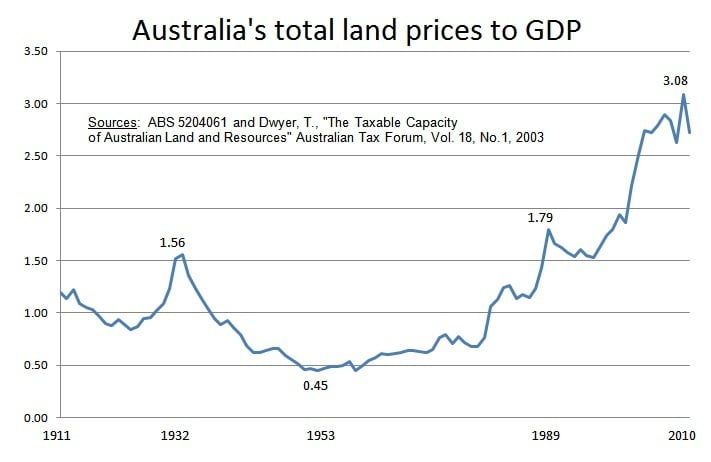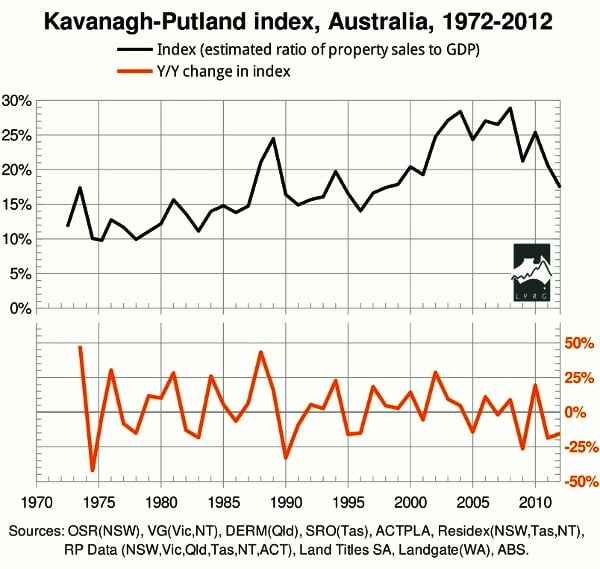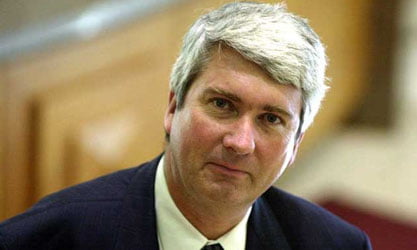Unfortunately, we don’t know from which of the two major parties this note emanated, but we suspect it doesn’t matter.
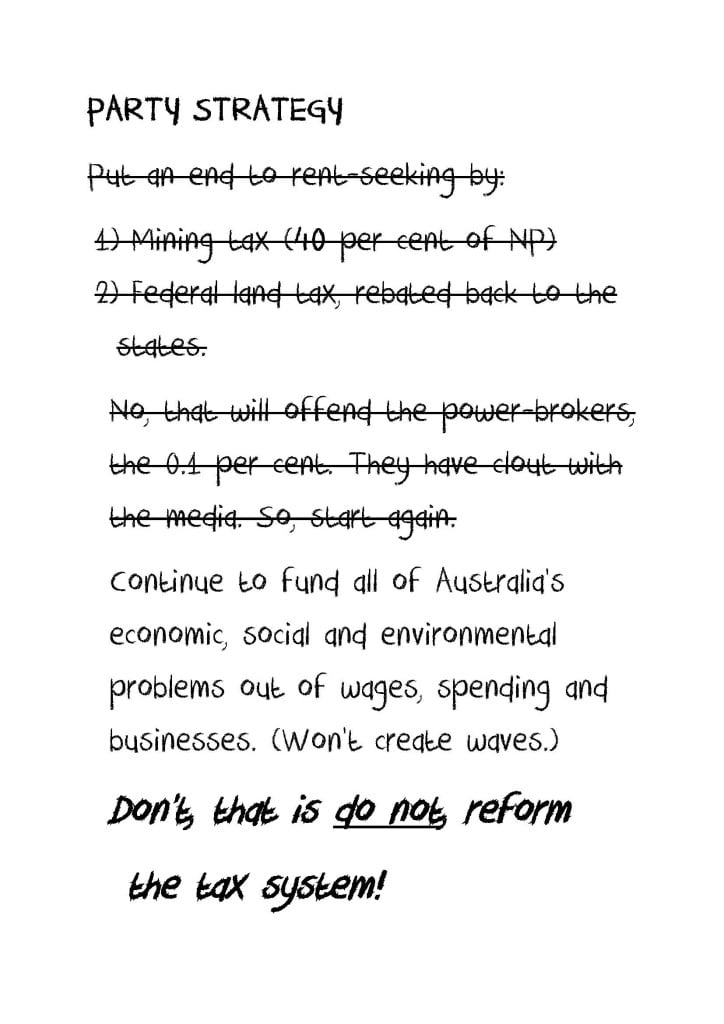
PROPERTY BUBBLE, THAT’S THE THEORY ANYWAY
Interesting article (by Philip Soos) and discussion in “The Conversation” today. https://theconversation.com/property-bubble-thats-the-theory-anyway-16814#comments
.
STEVE KEEN SHOWS IT’S PRIVATE DEBT THAT’S THE KILLER …
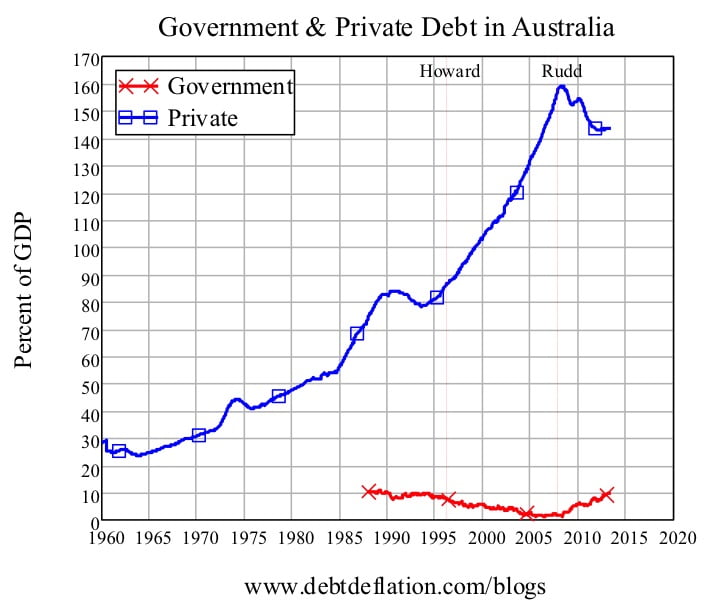 … whilst some of the commenters on his article don’t understand why he puts our private debt over GDP.
… whilst some of the commenters on his article don’t understand why he puts our private debt over GDP.
http://www.businessspectator.com.au/article/2013/8/5/economy/whos-responsible-australias-debt-crisis
It paints a picture that’s worth a thousand words, you dodos! That why I started to put the total value of Australia’s real estate sales over GDP in the 1990s. It’s only neoclassical economists in the thrall of the 0.1% who don’t want to see the telling pictures painted by these charts!
Maybe private debt is so high because 1) land prices have hit a similarly enormous peak, and 2) average real wages are less now than they were back in 1972?
Do you think there may be a structural fault at work here?
Might it not have something to do with a tax system that penalises you when you earn, produce or spend, yet rewards you when you inflate asset values?
FIRST HOME BUYERS NOW (PROPERLY?) UNDER-REPRESENTED
WITHOUT REVENUE REFORM THIS IS A POINTLESS ELECTION
So S14 has become S7? Would it be too churlish to think that’s about the biggest political change we can expect “going forward” as they say?
Oh sure, the Lib/Labs will screw us over in different ways, but it’s tantamount to each of the political parties deciding which of the Titanic’s chairs they will re-arrange for us as they direct us towards the inevitable iceberg.
If I don’t agree with him on guns, I’m certainly with former Minnesota governor Jesse (the body) Ventura that political parties are proving to be a blight on western society because they’ve slowly but surely become corrupted.
Now wait a minute! I’m not simply being negative. I’ve thought this through from a long way out and it sends my blood pressure racing to watch Australia relentlessly following my script into a depression, a script that says without the necessary political action we’re about to put many Australians and their businesses onto the scrap heap, signifying the period of Nikolai Kondratieff’s fourth long wave since 1790.
Economists don’t believe the K-wave exists. They can’t, because it demonstrates their supreme impotency which came about when they threw out the classical handbook and began to conflate land with man-made capital. Almost to a man they now hold that the future is unknowable, and, as if to underline the point, Treasury has just announced a revenue write-down of $33 billion in a matter of months. And it aint going to get any better, guys! You can forget about that proposed surplus for financial year 2017!
How do I know this? How do I know any better?
Well, I understand how an economy works because I am both a Henry Georgist and a real estate valuer. I know Australia has to generate real wealth, not just blow up asset bubbles which only provide the pretense of wealth.
I know the tax regime has increasingly given a green light to rent-seeking and a red light to labour and capital since 1972; such that average real wages are now less than they were in 1972, and; such that the current level of household debt can no longer be repaid.
Most importantly, I know the difference between land values and land prices. I know what constitutes a bubble. And that bubbles burst.
However, it aint just me, anybody with an open mind knows something has to give, and in a big way, unless we act immediately to change our tax system to support all Australians, not just the privileged few.
A revolutionary change along the lines of Ken Henry’s excellent recommendations which will capture much more of our publicly-generated natural resource rents will certainly help us resist catastrophe. (Remember the original mining tax? Remember the all-in land tax?)
But governments, ignorant of the overarching picture I’m able to paint because they believe their economic advisors, will most likely continue supporting the “big end of town”–banks and other rent-seekers– in a futile attempt to keep land price bubbles inflated, instead of properly managing their deflation.
Bubble in land prices, some may ask? Yes, take a look at this biggie. Some mistakenly say it’s caused by population growth and a concomitant shortage of land, but as I’ve divided the total land prices of Australia by our GDP that takes care of such overly-simplistic excuses.
You’ll see land prices got as high as three time our GDP because the tax system favours rent-seekers and fines creators of real wealth. This only assists the 1% and is quite wrong: full stop.
So, in the early 1990s I thought I’d create an index that would hit people between the eyes to make my point. What if I was to gather all Australia’s real estate sales, residential, commercial, industrial and rural, and divide their prices by our GDP for each year? Would the index confirm my analysis, I asked myself?
It does. You’ll note the current massive bubble from 1997 is well into its final deflation. Australian governments will usually change hands at the end of each real estate bubble as the change in the index closely approaches, or crosses below, the -25% mark. This one looks headed below the -50%!
Some people hold that the share market is the best economic indicator, but it’s not. You won’t have a recession or depression if the real estate market hasn’t burst first. It had in the mid-1920s: it hadn’t in October 1987.
Initially dubbed the “Barometer of the Economy” in a number of public addresses I’d given, my index morphed into the “Kavanagh-Putland Index” (or KPI) more recently, after I had secured the estimable mathematical assistance of Prosper Australia’s Dr Gavin Putland.
Don’t let Australia’s politicians know (because they won’t listen anyway) but there’s $1 trillion to be written off in the current real estate debt bubble before Australia can hope to emerge from the upcoming disastrous price-drop. It’s not at all shaping up well for Australian society. Unless, that is, as Professor Irving Fisher said before the US stock market collapse of 1929, we have reached “a permanently high plateau.”
If neither political party has the fortitude to press for the Henry Review panel’s recipe for reform of Australia’s terminally ill revenue regime, politicians of all stripes are likely to prove to be as delusional as Irving Fisher when he was faced with a real depression. This one’s as real as they get, so it’s not time for the political process to freeze!
As the parties remain in denial, this bodes to be a “nothing” election for the Australian ship of state. Watch out as they start moving those chairs about your feet and around the deck, folks!
HEY! THE REMEDY IS PRETTY SIMPLE IPA, GRATTAN INSTITUTE AND OTHER THINK TANKS
It’s like this:
CURRENT SCENARIO (How we became ‘post industrial’)
Heavy taxes on labour, capital and productivity harm manufacturing and the real economy, and less wealth is generated. And low taxes on land and mineral rents generate inflated asset (land) prices, impossible mortgages, greater household debt and inflated finance and real estate sectors.
REFORMED SCENARIO (How we might return to greater capture of our natural resource rents.)
Slash/abolish taxes on workers and business to generate greater wealth, genuine prosperity and a vast reduction in private debt. At the same time, capturing the publicly-generated rents from land and natural resource for revenue will lower land prices (and mortgages) and create greater real wages.
These are the alternatives. The decision is obvious. Neither the GST nor transactions taxes feature in the solution, because taxes are the problem.
TREASON PART 2: THE CRUCIBLE OF TERROR
TREASON PART 1: CASINO CAPITALISM
BUSINESS SPECTATOR COMMENT
Could have expressed it better, but at least I got it out of my system:
BUSINESS SPECTATOR Wednesday 31 July 2013
Alan Kohler “The Myth of Pay for Performance”
Bryan Kavanagh commented:
Yes, ludicrous salaries and we fawn on these moguls. It’s called rent-seeking – or stealing what’s not yours, Alan. People should Google the term if they’re not au fait with it. It’s why the world financial system has collapsed, and banks are expert rent-seekers too. They offer excessive credit, thereby inflating real estate bubbles and tying customers to bubble-inflated mortgages for 30 years. Oh yes, people may change their bank, but the bubble-inflated mortgage, the grip of death, remains.
Oh, and when the bubble finally bursts and bank profits are no longer there, or they risk going under for their risk management failure–as in the US and Europe–they then seek AND RECEIVE bailouts because they are “too big to fail”! Please get me into such a rent-seeking business in finance or real estate where win/win is the only possible outcome! Nice!
World economies will self-correct once we develop the intestinal fortitude to stop looking the other way on rent-seeking.
FRANK BRENNAN AND HUMAN RIGHTS
On Channel 2’s 7:30 Report tonight human rights lawyer Frank Brennan from the Australian Catholic University spoke about Australian refugee policy, namely, “Everyone will end up being sent offshore”, to quote minister Tony Burke.
Professor Brennan was rightly aghast, saying if the Labour and Liberal parties’ “shock and awe” tactics on boat people were to be accepted by the High Court it would mean “in jurisdictional terms that Australia can do whatever it likes”.
Yep, I certainly agree. It’s one of the least moral positions Australia has taken.
But is this not the same Frank Brennan who has managed to skirt deftly around the issue of the greatest human right of them all: the right of citizens to an equal share in their nation’s land and natural resource rents? [“The land shall not be sold ..”] Someday I’d like to hear Brennan speak on this most fundamental topic. After all, he is a human rights lawyer.
Despite having high profile in the Australian community I’ve not heard Frank Brennan address the question of land rent since first I put it to him at a meeting at Holy Saviour Church Glen Waverley North in the 1980s. Did he blanch at my question when I put it to him, or was it my imagination? His evasive response certainly failed to get to grips with it.
I’m still listening to you with great hope, Frank. Australia sorely needs moral leadership on the point, particularly at this most critical time in world history.
By the way, this is not the same Frank Brennan–another Canberra lawyer–who wrote the excellent book “Canberra in Crisis”. That Frank Brennan did not squib the issue. He was not afraid to speak out on capturing land rents for the people.
~~~~~~~~~~~~~~~~~~~~~~~~~~~~~~~~~~~~~~~~~
William Blackstone (1723-1780) “Commentaries”:
The earth, therefore, and all things therein, are the general property of all mankind, from the immediate gift of the creator.…there is no foundation in nature or in natural law why a set of words upon parchment should convey the dominion of land.


